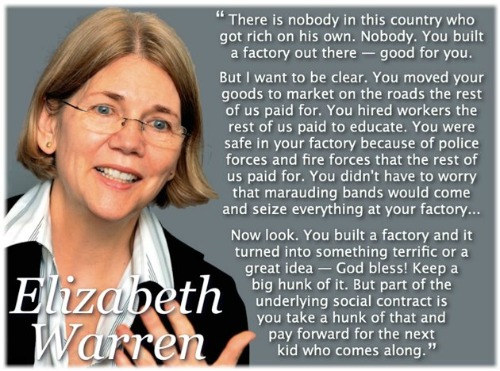One of the incisive graphics that circulated on the Internet recently is a photograph titled, sarcastically, “Down with Evil Corporations.” The photo vividly illustrates the irony of an “Occupy Wall Street” mob shouting their protests of capitalism . . . all while using the products of the very capitalism they denounce.
Image from BigGovernment.com
It is perfectly valid to shine a light upon the ignorance and hypocrisy of the anti-capitalist crowd, and images like the one above are excellent concrete encapsulations of the protesters’ sheep-like innocence of facts and historical context. But in doing so it is important to keep in mind that there are deeper issues at stake than mere hypocrisy.
The reason I point this out is that on the surface, this common-sense criticism of the “Occupy Wall Street” mobs might seem to share ground with another famous (or infamous) argument that made the rounds on the Internet recently: Elizabeth Warren’s quote, “There is nobody in this country who got rich on his own, etc.”
Image from BookWormRoom.com.
Superficially, these arguments may seem similar. The anti-capitalists have no grounds to criticize capitalism while snapping photographs with Sony cameras, shaving with Gillette razors, and wearing clothes from The Gap. In turn, capitalists have no grounds to criticize the government and high taxes while using public roads to transport goods, hiring workers educated in public schools, and feeling safe in their factories because of police protection. (Actually, Warren’s argument goes much further than merely accusing the rich of criticizing the government; her explicit goal is to seize a “big hunk” of producers’ wealth.) Both arguments amount to the idea that it is improper to simultaneously benefit from and complain about some condition or institution.
However, to unite these two arguments would be a logical error; it would constitute an attempt to integrate concretes by non-essentials. When generalizing, it is necessary to apply the mental process of abstraction--but in doing so, one must not focus on non-essential attributes at the cost of fundamental principles. The mistake that would be made in attempting to unite Warren’s criticism of businessmen with that of bloggers’ and pundits’ criticisms of the “Occupy Wall Street” protesters is to gloss over the content of those criticisms.
The fundamental principle here is force. The "Occupy Wall Street" demonstrators voluntarily use the fruits of a free society to complain about that free society. Under capitalism, nobody--including Google, Apple, IBM, Proctor & Gamble, Exxon-Mobil, Alcoa, DuPont, Hewlett Packard, 3M, Abercrombie & Fitch, WalMart, the local supermarket, barbershop, bodega, plumber, service station, or lemonade stand--can force you to use their products. The only way they can obtain your business is by offering you value--a value that you judged to be greater than the money you paid for it. No matter how much one believes big companies to have the “upper hand” over the “little guy,” it is not force. On the contrary, the more the products of “Big Oil,” “Big Pharma,” “Big Food,” etc. are recognized to be vital human needs, the more crucial it is to identify the political freedom that makes such voluntary transactions possible.
In contrast, a government by its very nature can only apply force. It is all they do. Force is the raison d’etre of governments; compulsion is all they bring to the table. When government force is used appropriately (i.e. in a retaliatory manner) via the police, armed forces, and court system, it serves to safeguard individual rights. When government force is used inappropriately (i.e. in an initiated manner), which includes any and all intrusions into the economy, education, and morality, it violates individual rights.
The first thing to be observed about Warren’s comment is that she conjoins proper (e.g. police) and improper (e.g. roads and education) functions of government without distinguishing between the two. But the point most relevant to this discussion is Warren’s accusation that the wealthy use government services without paying for them. (She had the brazen mendacity to say “the rest of us” paid for roads, education, etc., when in fact the wealthiest citizens shoulder the biggest tax load by far.) This disregards the fact that such “services” are forced upon all of us. Productive citizens are compelled to pay for government programs whether they like it or not.
Elizabeth Warren’s argument amounts to using the fact that the wealthy were forced to use the “services” of an intrusive government in the past as a pretext to force them to pay for still more government intrusions. These new “services,” being ever more difficult to avoid, serve as justification for the next generation of government intrusions, and so on. Ms. Warren’s declaration follows, in all relevant aspects, the form of a protection racket. Whether or not the self-righteous and thuggish manner with which she delivered it also follows the style of a protection racket may be judged by observing her performance directly.[1]
Those who condemn the “Occupy Wall Street” mob for their hatred of capitalism are right for the same reason that Elizabeth Warren is wrong. The fundamental issue is not mere hypocrisy but political liberty, of which Warren is an explicit enemy and most members of the mob are unthinking antagonists.
NOTES
1. See the YouTube video, “Elizabeth Warren on Fair Taxation,” http://www.youtube.com/watch?v=hOyDR2b71ag.








